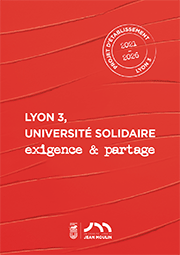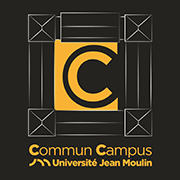AccueilRechercheLes productions scientifiquesThèsesThèses soutenuesThèses soutenues - 2006-2020Thèses soutenues - 2011
-
Partager cette page
- Recherche,
MEDDOUR Sabrina
L'enfant et la liberté religieuse à la lumière du droit international, européen et français
Publié le 3 janvier 2012 – Mis à jour le 4 janvier 2012
Thèse en Droit - Droit public Soutenue le 15 décembre 2011
Le droit à la liberté de pensée, de conscience et de religion expressément reconnu à l’enfant par l’article 14 de la Convention internationale de New York adoptée en 1989 soulève de nombreuses questions. En raison de l’état de dépendance de l’enfant et de sa vulnérabilité, l’exercice de cette liberté apparaît particulièrement fragilisée. Les droits de l’enfant sont en effet menacés de toute part, tant par l’autorité publique, que par sa famille, ou par des tiers, voire par l’enfant lui-même. Les parents tout en étant les premiers protecteurs et les premiers « guides spirituels » de l’enfant pourront parallèlement représenter les premiers obstacles à l’exercice de sa liberté religieuse pleine et entière suscitant un conflit entre droits parentaux et droits de l’enfant. L’État s’érige d’ailleurs en protecteur lorsque ses parents lui font courir un risque au nom même de leurs convictions religieuses. Le juge pourra aussi connaître de conflits familiaux provoqués par un désaccord religieux. Garant de l’ordre public, l’État sera parfois amené à limiter la liberté religieuse de l’enfant et de ses parents en mettant en avant la primauté d’un intérêt social tel la sauvegarde du principe de laïcité. Il apparaît donc nécessaire de considérer la question de la liberté religieuse de l’enfant à la fois dans la sphère familiale et plus largement dans la société en nous interrogeant notamment quant à l’effectivité réelle du droit de liberté religieuse de l’enfant. Comme pour tout sujet touchant aux droits de l’enfant, la recherche de l’équilibre entre liberté et protection s’inscrit sur un chemin difficile dont témoigne l’étude du droit de l’enfant à la liberté religieuse.
The right to freedom of thought, conscience and religion expressly granted to the child under article 14 of the Convention on the Rights of the Child adopted in 1989 raises many questions. Regarding his particular dependence and vulnerability, the exercise of this liberty by the child appears particularly weaken. Children’s rights are indeed threatened from all quarters, so much by public authority as by their family or by third parties, if not by the child himself. Parents, while being his first protectors and first “spiritual guides”, can also represent the first obstacle to the full exercise of the child’s freedom of religion, therefore raising a conflict between parental and children’s rights. It is to be noticed that the State establishes itselfs as the protector of the child whenever parents endanger him even in the name of religious beliefs. The judge might also intervene within family conflicts resulting from religious disagreements. Ensuring public order as well, the State will in some cases subject child’s and parents’ freedom of religion to limitations deemed necessary in regard to the primacy of a particular social interest such as the protection of secularism. It seems therefore essential to consider the question of the child’s religious freedom within the family sphere as well as, to a larger extent, within society, while questioning the effectivity of the right of the child to religious freedom. As for any subject relating to children’s rights, the search for balance between freedom and protection is engaged on a difficult path as evidenced by this study on the right of the child to religious freedom.
Mots clés : Droits de l’enfant – Religion – Croyances – Liberté religieuse – Liberté de conscience – Liberté de religion – Convention internationale des droits de l’enfant – Prémajorité religieuse – Intérêt de l’enfant – Autorité parentale – Éducation religieuse – Sectes – Dérives sectaires – Laïcité – École – Signes religieux – Enseignement religieux– Santé de l’enfant – Refus de soins – Mutilations sexuelles
Key words : Children’s rights – Religion – Beliefs – Religious freedom – Freedom of Conscience – Freedom of Religion – Convention on the Rights of the Child – Religious premajority – Interest of the Child – Parental Authority – Religious Education – Cults – Sectarian Excesses – Secularism – School – Religious Signs – Religious teaching – Child’s Health – Refusal of Treatment – Sexual Mutilations
Directeur de thèse : Christine FERRARI-BREEUR
Membres du jury :
Adeline GOUTTENOIRE, Professeure, Université Montesquieu Bordeaux IV
Gérard GONZALEZ, Professeur, Université de Montpellier 1
Christine FERRARI-BREEUR, Professeure, Université Jean Moulin Lyon 3
Hélène SURREL, Professeure, Institut d'Etudes Politiques, Université Lyon 2
Président du jury : Hélène SURREL
Mention : Très honorable
Equipe d'accueil : IEA
The right to freedom of thought, conscience and religion expressly granted to the child under article 14 of the Convention on the Rights of the Child adopted in 1989 raises many questions. Regarding his particular dependence and vulnerability, the exercise of this liberty by the child appears particularly weaken. Children’s rights are indeed threatened from all quarters, so much by public authority as by their family or by third parties, if not by the child himself. Parents, while being his first protectors and first “spiritual guides”, can also represent the first obstacle to the full exercise of the child’s freedom of religion, therefore raising a conflict between parental and children’s rights. It is to be noticed that the State establishes itselfs as the protector of the child whenever parents endanger him even in the name of religious beliefs. The judge might also intervene within family conflicts resulting from religious disagreements. Ensuring public order as well, the State will in some cases subject child’s and parents’ freedom of religion to limitations deemed necessary in regard to the primacy of a particular social interest such as the protection of secularism. It seems therefore essential to consider the question of the child’s religious freedom within the family sphere as well as, to a larger extent, within society, while questioning the effectivity of the right of the child to religious freedom. As for any subject relating to children’s rights, the search for balance between freedom and protection is engaged on a difficult path as evidenced by this study on the right of the child to religious freedom.
Mots clés : Droits de l’enfant – Religion – Croyances – Liberté religieuse – Liberté de conscience – Liberté de religion – Convention internationale des droits de l’enfant – Prémajorité religieuse – Intérêt de l’enfant – Autorité parentale – Éducation religieuse – Sectes – Dérives sectaires – Laïcité – École – Signes religieux – Enseignement religieux– Santé de l’enfant – Refus de soins – Mutilations sexuelles
Key words : Children’s rights – Religion – Beliefs – Religious freedom – Freedom of Conscience – Freedom of Religion – Convention on the Rights of the Child – Religious premajority – Interest of the Child – Parental Authority – Religious Education – Cults – Sectarian Excesses – Secularism – School – Religious Signs – Religious teaching – Child’s Health – Refusal of Treatment – Sexual Mutilations
Directeur de thèse : Christine FERRARI-BREEUR
Membres du jury :
Adeline GOUTTENOIRE, Professeure, Université Montesquieu Bordeaux IV
Gérard GONZALEZ, Professeur, Université de Montpellier 1
Christine FERRARI-BREEUR, Professeure, Université Jean Moulin Lyon 3
Hélène SURREL, Professeure, Institut d'Etudes Politiques, Université Lyon 2
Président du jury : Hélène SURREL
Mention : Très honorable
Equipe d'accueil : IEA
Documentation
Mise à jour : 4 janvier 2012



